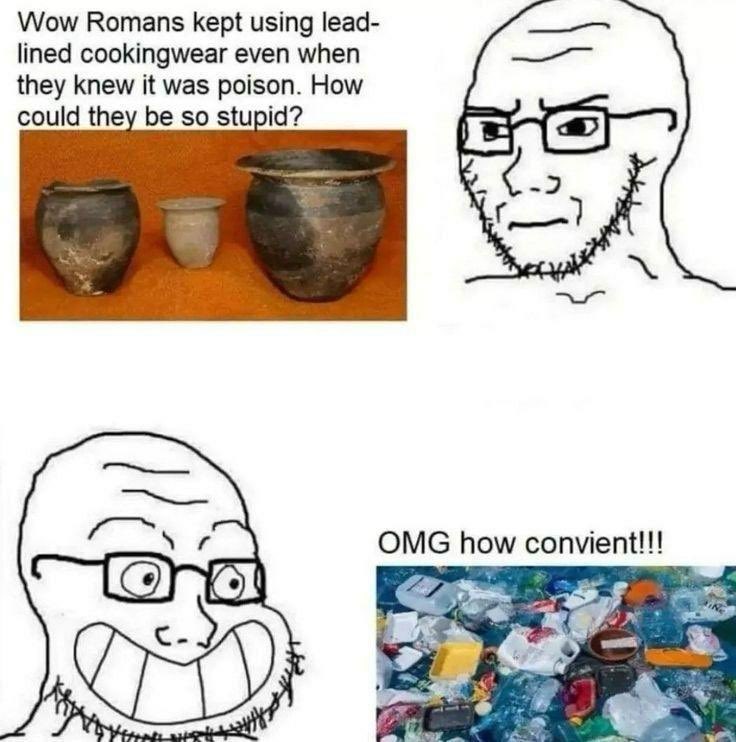this post was submitted on 05 Dec 2023
1074 points (96.6% liked)
Memes
8938 readers
1192 users here now
Post memes here.
A meme is an idea, behavior, or style that spreads by means of imitation from person to person within a culture and often carries symbolic meaning representing a particular phenomenon or theme.
An Internet meme or meme, is a cultural item that is spread via the Internet, often through social media platforms. The name is by the concept of memes proposed by Richard Dawkins in 1972. Internet memes can take various forms, such as images, videos, GIFs, and various other viral sensations.
- Wait at least 2 months before reposting
- No explicitly political content (about political figures, political events, elections and so on), [email protected] can be better place for that
- Use NSFW marking accordingly
Laittakaa meemejä tänne.
- Odota ainakin 2 kuukautta ennen meemin postaamista uudelleen
- Ei selkeän poliittista sisältöä (poliitikoista, poliittisista tapahtumista, vaaleista jne) parempi paikka esim. [email protected]
- Merkitse K18-sisältö tarpeen mukaan
founded 2 years ago
MODERATORS
you are viewing a single comment's thread
view the rest of the comments
view the rest of the comments


Aluminum cans are actually coated in plastic to avoid corrosion.
Which is actually critical because aluminium compounds are also neurotoxic similar to lead. There are advisories against especially cooking acidic foods in aluminium cookware because the acid, especially if heated, can easily break through the oxide layer and react with the aluminium, forming soluble compounds that are easily absorbed when eaten. And soda is quite acidic so I imagine without the plastic film they'll all turn into poison within a few weeks (I mean, more poisonous I guess).
Honestly we're starting to realize that aluminium is the lead of the modern age. Not to nearly the same extent as lead obviously, but the mechanisms for how they harm people are similar. Not saying we go as far as to ban aluminium, but we need to be smart about how and where it's used (i.e. should ideally be avoided for food packaging or preparation) and seek out better alternatives when aluminium doesn't work well for an application.
Need some sources on these claims. My dive on Wikipedia didn't reveal anything akin.
https://www.sciencedirect.com/science/article/pii/S0308814603003789
https://www.sciencedirect.com/science/article/pii/S0308814600000686
https://www.sciencedirect.com/science/article/pii/S0048969796053478
You can bypass paywalls by copying the DOI and pasting it into SciHub--uh I mean, you should definitely buy these papers and give the publishing company the exorbitant royalties it so rightfully deserves after they've already taken the researchers' money to publish it in the first place.
All three of these studies are related to Aluminium leaching into food from cookware or take up from soil. Sorry, I should have been more specific.
Wikipedia cites that there has been no conclusion on Aluminium causing Alzheimer's, just that it's more prevalent as deposits in patients' brains affected by Alzheimer's. So it's an effect there.
One of your linked papers establishes the following in the Introduction: The toxicity of Aluminium is well known among patients with renal failure. Now I didn't follow the cited papers to establish the "well known" claim of this, however someone with renal failure will likely have other worries besides just Aluminium toxicity.
I'm just trying to be thorough because I've heard claims pro and contra Aluminium toxicity and dementia. Around mid 2010s I got into a scare of replacing every Aluminium and fluoropolymer coated cookware with iron, ceramic and glass, especially since my grandpa died from some form of degenerative dementia just five years prior. Now it looks like my concerns regarding Teflon and it's little family were justified, however evidence against Aluminium seems to be sparse.
Admittedly I am not familiar with the specific health effects of aluminum compounds beyond the basic fact that they are neurotoxic and not good for us, but plenty of things are neurotoxic and bad for us and I admittedly don't really know the extent that aluminum is a problem (nor am I claiming it causes any specific health effects, to be clear). I've personally researched more into the leaching aspect than the neurotoxicity aspect, if for nothing else than I find those interactions between materials interesting, and personally it's more than enough to put me off using them, considering our track record of massively underestimating harm from things similar to this, but that's entirely just my own opinion for what kind of cookware I'm willing to use. I do appreciate you trying to be thorough and I wish I had more relevant links at hand.
https://pubmed.ncbi.nlm.nih.gov/24779346/ potentially?
That's bad.
Are tin/steel cans (for food rather than drink) also tainted?
Steel cans sometimes are. Depends on the food. Tomatoes are usually in copper-coated cans(orange), pineapple in tin-coated cans(matte grey), but there are chrome coatings(yellow) white enamel, and plastic. Look at the inside of the can. Heating the can will reveal if it's a metal coating or plastic.